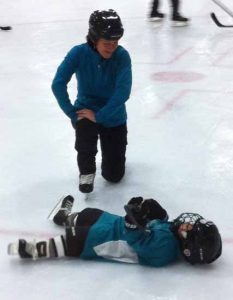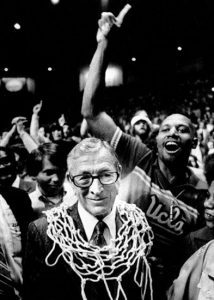
I almost missed it. My daughter and I were up in the bleachers watching her son at a house league hockey practice. The six-year-olds were skating, falling, trying to stickhandle and the arena was bursting with noise. Then I spotted this one boy standing way off to the side, crying, wanting off the ice. One of the volunteer coaches skated over to him, got down on his knees and quickly connected with the boy in conversation.
The boy stopped crying. The coach’s face looked very encouraging and before long the boy was over the trauma and re-joined the practice. Nobody seemed to notice the exchange. It was low key, calming, but clearly motivational. And I thought of that quote by that U.S. national basketball coach from the 1970s.
“The true test of a man’s character is what he does when no one is looking,” John Wooden once said.

Coach Wooden had many words of wisdom for the hoop players he coached at UCLA back then. He also taught his players to be more concerned about their character, than about their reputations, since once a player’s ability got him to the top, it would be his character that kept him there. He offered his players lots of other gems of encouragement over the years, but a lot of his philosophy had to do with doing good anonymously, invisibly, selflessly.
I think Wooden’s words of wisdom relate well beyond the competitive sport arena. I’ve seen people make a difference inconspicuously in many areas – on the street, at school campuses, in the arts, among service and other charitable groups. From the young. From the old. But what remains consistent – at least as far as the Wooden principle is concerned – is that the best examples were the ones when very few people noticed, and when the interaction reflected character, not reputation.
Last year, during my travels to the Vimy 100th observances in France, I had the good fortune to travel not only with exceedingly fascinating adults, but also with keenly motivated youth from Uxbridge Secondary School. Part of their enthusiasm for living history and their resulting fascination for our veterans’ stories and welfare, came from their teachers. But as Coach Wooden also said, “Make friendship a fine art. Help others.”

One student in particular, Emma Runnalls, has practised all of that and more. In fact, she became so passionate about efforts to have Sam Sharpe’s reputation restored on Parliament Hill with artist Tyler Briley’s relief, that she took it upon herself to write Ottawa.
“A local artist and firefighter, like Sharpe, has suffered with PTSD,” she wrote MP Jennifer O’Connell. “Tyler Briley found a connection to his piece of art and thought of it as a way of healing.” Nobody told her to write her MP. It wasn’t from peer pressure, for marks or her ego. It was her heart and her head telling her to do what might help. And she did it.
There are lots of others around our community who contribute quietly, almost invisibly. Coincidentally, there’s another group with an eye out for veterans, however their forum is not the public arena. It isn’t within sight of any media. The group designs, assembles and stitches quilts for servicemen and women whose lives, they feel, could be enriched by receiving these personally fashioned pieces of art and comfort. Last fall, on their behalf, I presented one of their quilts to Mort Lightstone, an RCAF veteran of the Korean War. He said he’d never heard of the quilters, and had never experienced such unsolicited attention.
Have you noticed when it’s really slippery on downtown sidewalks, there are a lot more Good Samaritans helping others get around? I watch community-minded dog walkers not only clean up after their own pets, but for others who carelessly don’t or won’t. And I’ve seen people in line for a cashier give strangers cash to make up a few dollars if they’re unexpectedly caught short. There are lots of people practising Coach Wooden’s philosophy of doing something for someone who will never be able to repay you. When you ask them why, they just say, “Pass it on.”
When Josh Morrison, another Uxbridge Secondary School student, said he thought he’d collect 10 million pennies to help fund a Habitat for Humanity home, most adults suggested he consider reaching for something more plausible. “Hard is not a synonym for impossible,” he told reporters in 2013. “I believed I could and I did.” Four years later he’d quietly but persistently collected all those out-of-circulation pennies in people’s pockets, dresser drawers and change pouches, and last year his $106,000 in pennies went to build a home for a family in Oshawa.
“It’s amazing how much can be accomplished, if no one cares who gets the credit,” John Wooden also said.
I’m sure there are plenty among us who live by such philosophy. But because they shun the spotlight, prefer to do good without being noticed, the rest of us are quite prepared to say the world is going to Hell in a handbasket, instead of trying to fill that handbasket with goodwill ourselves.